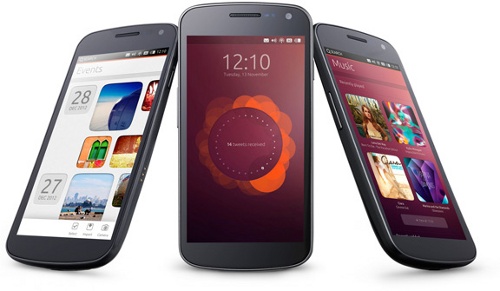- Qualcomm Launches Snapdragon 4 Gen 2 Mobile Platform
- AMD Launches Ryzen PRO 7000 Series Mobile & Desktop Platform
- Intel Launches Sleek Single-Slot Arc Pro A60 Workstation Graphics Card
- NVIDIA Announces Latest Ada Lovelace Additions: GeForce RTX 4060 Ti & RTX 4060
- Maxon Redshift With AMD Radeon GPU Rendering Support Now Available
Canonical Announces Ubuntu for Smartphones
Canonical had been teasing a touch OS for the past couple of days, but like most people, I thought we were going to see a desktop solution or perhaps a tablet one. But no, we’re dealing with a smartphone solution here, and I must say I’m rather impressed. Canonical has announced that it will be showing off the OS at CES, happening next week, so this isn’t some mere soft launch.
So far, no smartphone models have been announced, but prototypes will be shown using a Galaxy Nexus. The idea is that smartphone vendors could opt for Ubuntu over Android, as Canonical has been making sure that its OS remains fully compatible with the hardware. More than Android, the company calls its smartphone OS a “full PC”.

As solid as Ubuntu’s smartphone variant may be, its success will hinge on developer support. One of the biggest reasons Apple’s iPhone is so popular is due to its rich ecosystem, while the opposite could be said about Microsoft’s with Windows Phone. Canonical does have a couple of unique benefits, however. This mobile OS will feature a similar design as its desktop counterpart in that Web apps will be able to interface intelligently with the OS itself. You may be using a Web app, but the OS could see it as an actual application thanks to Ubuntu’s rich APIs.
While HTML5 apps are encouraged, developers can code in other languages as well, such as C or C++. As you’d expect, native OpenGL support is also provided. Canonical has stated that this well-rounded support is “why developers like EA, Valve Software and Unity Techologies are committing to Ubuntu right now“. Because Canonical’s goal is to make the desktop version of the OS and the smartphone variant inter-operate, developers could write once and then deploy to both. Given Ubuntu’s dominance on the consumer desktop, this could be a very intriguing prospect for developers.
Canonical’s requirements for its OS are modest, with a 1GHz Cortex A9 being required for “entry level”, and a quad-core A9 or Intel Atom being required for a superphone classification. The latter would also require a minimum of 1GB of RAM, and touts “desktop convergence”.
It’s going to be difficult for any smartphone OS vendor to penetrate this fiercely competitive market, but this is going to be a fun battle to watch.
On a side note, if you want to hear Canonical’s Mark Shuttleworth talk about the OS, here’s a way to kill 20 minutes.




